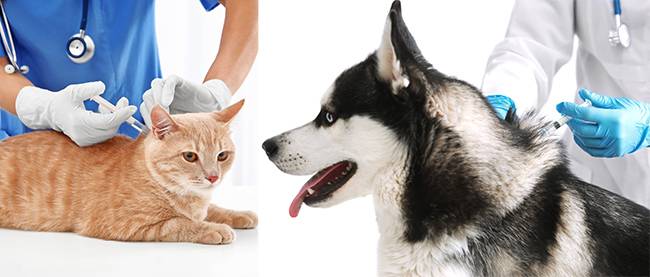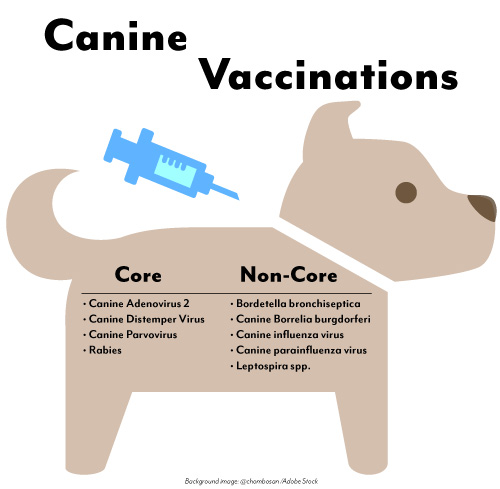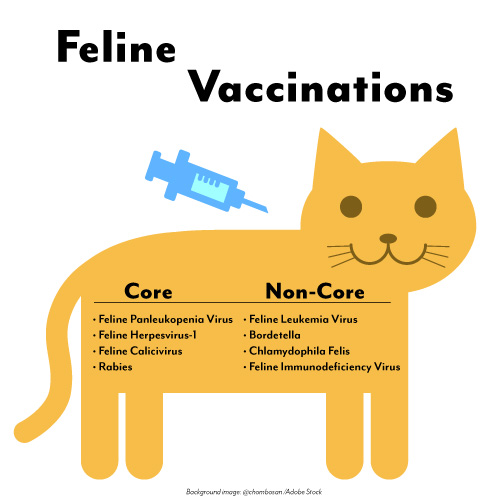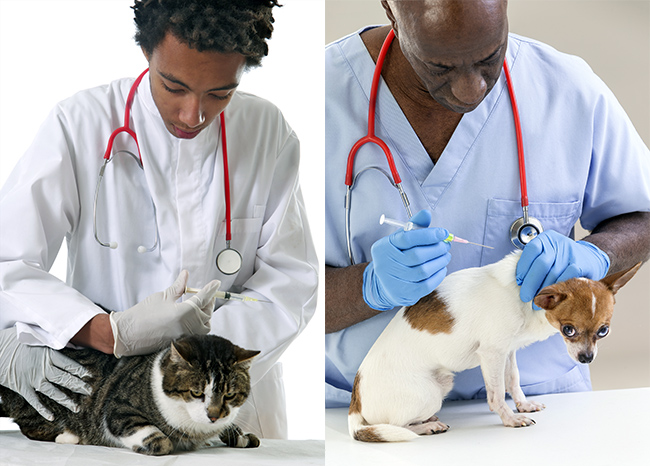
Keeping dogs and cats up-to-date on their immunizations is crucial to their health and well-being.
Imagine a time when distemper was rampant in dogs, killing those canines who weren’t able to fight off the virus. Or a time when cats who went outside were at great risk of contracting feline leukemia and eventually dying from the disease.
In the days before vaccines for distemper, parvovirus and rabies, puppies and dogs regularly died from these diseases. Cats frequently contracted their version of distemper called panleukopenia, as well as feline leukemia and rabies. But thanks to advances in veterinary medicine, these diseases and others are less deadly than they once were. Today, regular vaccines can protect your pet from potentially deadly disease.
Vaccines work by preparing your pet’s immune system to take on viruses and bacteria that can cause serious illness. The antigens in the vaccine stimulate the immune system to react quickly to the real disease if the pet is exposed. The body then fights off the illness before the pet becomes sick.
Vaccinating Dogs
 Dogs are social creatures who often enjoy meeting other dogs on walks and at the dog park. They also like sniffing the ground to get the scoop on other dogs who have passed through the neighborhood. As a result, dogs are prone to picking up infectious diseases, either through direct contact with other dogs or from the environment.
Dogs are social creatures who often enjoy meeting other dogs on walks and at the dog park. They also like sniffing the ground to get the scoop on other dogs who have passed through the neighborhood. As a result, dogs are prone to picking up infectious diseases, either through direct contact with other dogs or from the environment.
It’s the sociability of dogs that makes annual vaccines most crucial for them. Veterinarians typically recommend core vaccines, such as Canine Distemper Virus, Canine Parvovirus, Canine Adenovirus-2 (CAV-2) and Rabies for all dogs. Canines who are exposed to other dogs at parks, daycare or boarding kennels usually have bordatella on their list of recommended vaccines, as well as Canine Parainfluenza virus (kennel cough).[1] Rabies vaccines are mandatory for dogs in nearly every U.S. State. (Minnesota, Kansas, and Ohio have no state law requiring pets to be vaccinated for rabies; however, some local jurisdictions within each state do.[2])
While annual inoculations are important for adult dogs, vaccinations are crucial for puppies. Puppies have immature immune systems, and are very susceptible to disease. Every pup should get his first vaccine at 6 to 8 weeks of age, and receive a series of vaccines over the following few months. Core vaccines for puppies include distemper, CAV-2 and parvovirus—all illnesses that are highly contagious and often fatal to young dogs.
Vaccinating Cats
 Although cats are generally less social than dogs, they are still susceptible to contagious diseases. Feline leukemia, feline distemper, feline herpes, rabies and feline immunodeficiency virus infection can all be contracted by cats who spend time outdoors. Vaccines are crucial for these cats in order to keep them healthy.
Although cats are generally less social than dogs, they are still susceptible to contagious diseases. Feline leukemia, feline distemper, feline herpes, rabies and feline immunodeficiency virus infection can all be contracted by cats who spend time outdoors. Vaccines are crucial for these cats in order to keep them healthy.
The recommend core vaccines for all cats (outdoor and in) include Rabies, Feline Panleukopenia Virus, Feline Herpesvirus-1 and Feline Calicivirus. In addition, while not a core vaccine, Feline Leukemia Virus is recommended for kittens by the American Association of Feline Practitioners.[3] Other non-core vaccines that might be recommended depending on a cat’s lifestyle or genetic susceptibility include Bordetella, Chlamydophila Felis and Feline Immunodeficiency Virus.[4]
Just like puppies, kittens have immature immune systems and need a series of vaccines to help protect them from contracting serious disease. The first inoculation should be given when a kitten is 6 to 8 weeks of age, followed by several more vaccines until the kitten is 16 weeks old.
Consult Your Veterinarian
The best advice you can get on the topic of vaccines is from your veterinarian. Your vet can determine which vaccines your dog or cat should receive based on your pet’s age and lifestyle. In addition to core vaccines, your vet can recommend non-core vaccines that may be appropriate for your pet.
Your vet can also discuss any potential side effects and risks that come along with vaccines. In most cases, these risks are well worth the benefits that vaccines can bring.
[1] Ford, R. B., Larson, L. J., Schultz, R. D., & Welborn, L. V. (2017, October). 2017 AAHA Canine Vaccination Guidelines. Retrieved March 6, 2018, from https://www.aaha.org/public_documents/guidelines/vaccination_recommendation_for_general_practice_table.pdf
[2] Campbell Thornton, K. (2017, July 25). AVMA 2017: Rabies Vaccination – What You Need to Know. Retrieved March 06, 2018, from https://www.americanveterinarian.com/news/avma-2017-rabies-vaccination–what-you-need-to-know
[3] AVMA. (n.d.). AAHA-AVMA Feline Preventive Healthcare Guidelines. Retrieved March 06, 2018, from https://www.avma.org/KB/Policies/Pages/AAHA-AVMA-Feline-Preventive-Healthcare-Guidelines.aspx
[4] ASPCA. (2017). Vaccinations for Your Pet. American Society for the Prevention of Cruelty to Animals, https://www.aspca.org/pet-care/general-pet-care/vaccinations-your-pet



